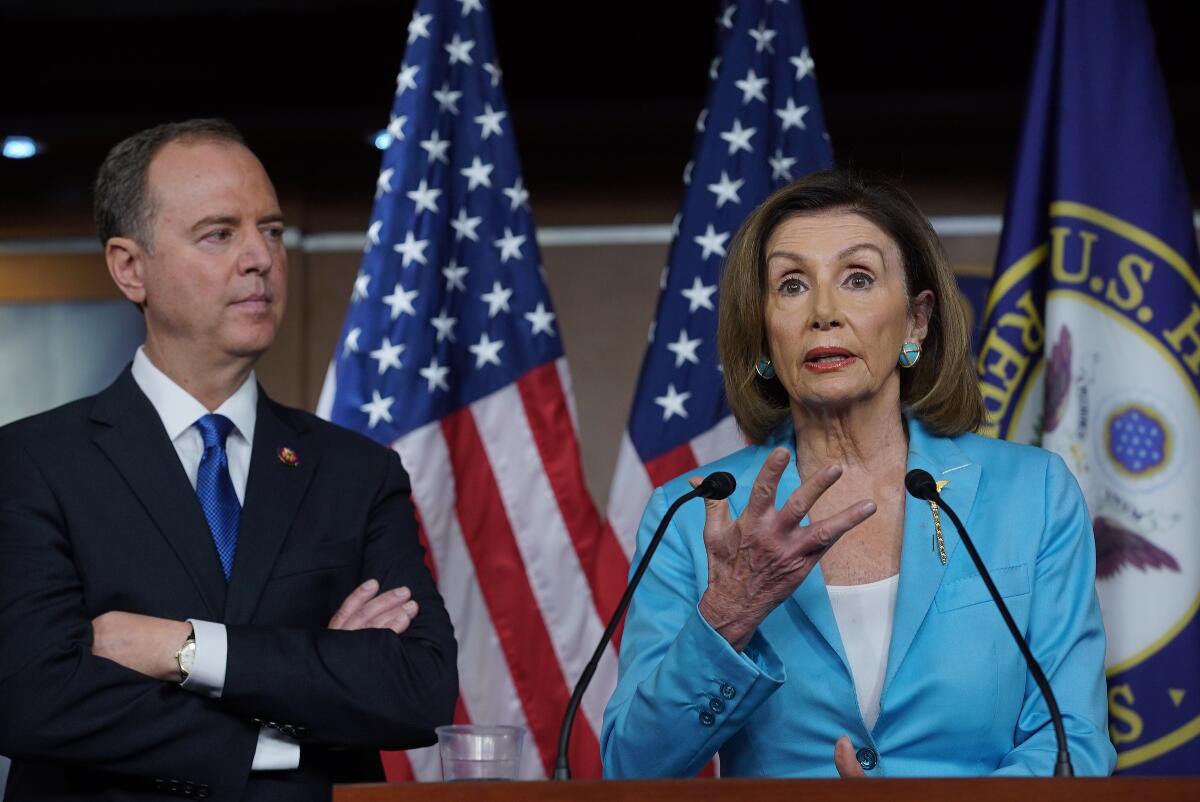Good luck to the whistleblower who reported Trump’s Ukraine call. He or she needs it.

- Share via
Even without President Trump’s strident demands for the name of the Ukraine whistleblower, he or she probably will not remain anonymous forever. And then what?
The whistleblower is likely to be in for a rough time professionally, since existing protections for whistleblowers are completely inadequate. No constitutional protection exists and statutory guarantees are unreliable.
Congress made an attempt to help shield government employees who report wrongdoing when it enacted the Whistleblower Protection Act of 1989, and legislators have added to the law since then. Under the original law, a current or former federal employee may report “a violation of law, rule, or regulation,” “gross mismanagement,” “gross waste of funds,” “abuse of authority,” or “substantial and specific danger to public health or safety” while, at least in theory, enjoying robust statutory protection against discharge or other forms of official retaliation.
But the law is deeply flawed. For one thing, while the Office of Special Counsel is required to investigate whistleblowers’ claims, it is also required to refer “credible” complaints back to the agency where the employee works — the very agency where the problem originated. And although the law includes a legal process for whistleblowing employees to seek redress if they suffer retaliation, it doesn’t set up meaningful protections to keep that retaliation from happening in the first place.
Most worrisome in this case, whistleblowers are only protected if their claims are found to be serious and credible, thus falling under the scope of the statute. Although the intelligence community’s inspector general found the Ukraine-gate whistleblower’s complaint to be credible, saying it raised issues of “urgent concern,” it was not immediately turned over to Congress after the Justice Department raised questions about whether it actually fell under the law’s mandate.
Even in cases that clearly fall under a state or federal whistleblower protection law, stories abound of government workers who suffer official retaliation for reporting wrongdoing through proper channels.
Employees at the Department of Veterans Affairs, for example, testified before Congress this year about being reassigned, demoted or otherwise punished after exposing serious lapses in the delivery of medical services to patients at VA hospitals. Reports of systematic retaliation against VA whistleblowers stretch back for years — yet nothing seems to change, and VA employees who report misconduct through proper channels do so at their own risk.
In this case, the calls for punishing the messenger are coming straight from the top. In a private meeting with U.S. diplomats last week, a recording of which was obtained by this newspaper, Trump spoke about the whistleblower and his or her sources. “You know what we used to do in the old days when we were smart? Right? The spies and treason, we used to handle it a little differently than we do now.”
Even if execution is taken off the table, whistleblowers can be subjected to many subtle forms of retaliation — from demotion or discharge (cast, of course, as being for some cause other than whistleblowing), to being blacklisted from future good assignments or losing key security clearances.
To date, federal courts have not recognized whistleblowing speech by government employees as worthy of any targeted 1st Amendment protection.
Correcting the situation would be relatively straightforward. For starters, it would require both state and federal courts to recognize the importance of such speech and extend meaningful constitutional protections (including those afforded under state constitutions) to whistleblowers. This could be accomplished in much the same way courts have extended 1st Amendment protections to employees who face firing or demotion based on their partisan leanings.
The U.S. Supreme Court in 1976 established constitutional protection against patronage firings. Moreover, it did so despite the existence of (inadequate) state and federal civil service laws that limited political patronage practices. The same considerations that led the Supreme Court to impose 1st Amendment limits on the spoils system should be applied in the case of whistleblowing speech that facilitates democratic accountability.
The statutes protecting whistleblowers also need strengthening. For starters, the law should take responsibility for investigating a whistleblowing complaint out of the hands of the agency accused of wrongdoing. An independent board, such as the Merit Systems Protection Board, an independent, quasijudicial agency that enforces the federal government’s civil service rules across all federal agencies, would provide a structure better able to insulate government employees from retaliation. When foxes guard henhouses — which is essentially how the current law works — the hens don’t flourish.
To hold government accountable through elections, voters need information, and sometimes the only way they can get crucial information is from public employees coming forward to reveal malfeasance the government is trying to conceal. It took great bravery for the Ukraine whistleblower to come forward. He or she — as well as those who follow — deserve better than they’re likely to get under the current system.
Ronald J. Krotoszynski Jr. is a professor and director of faculty research at the University of Alabama School of Law. He is the author of “The Disappearing First Amendment.”
More to Read
A cure for the common opinion
Get thought-provoking perspectives with our weekly newsletter.
You may occasionally receive promotional content from the Los Angeles Times.









